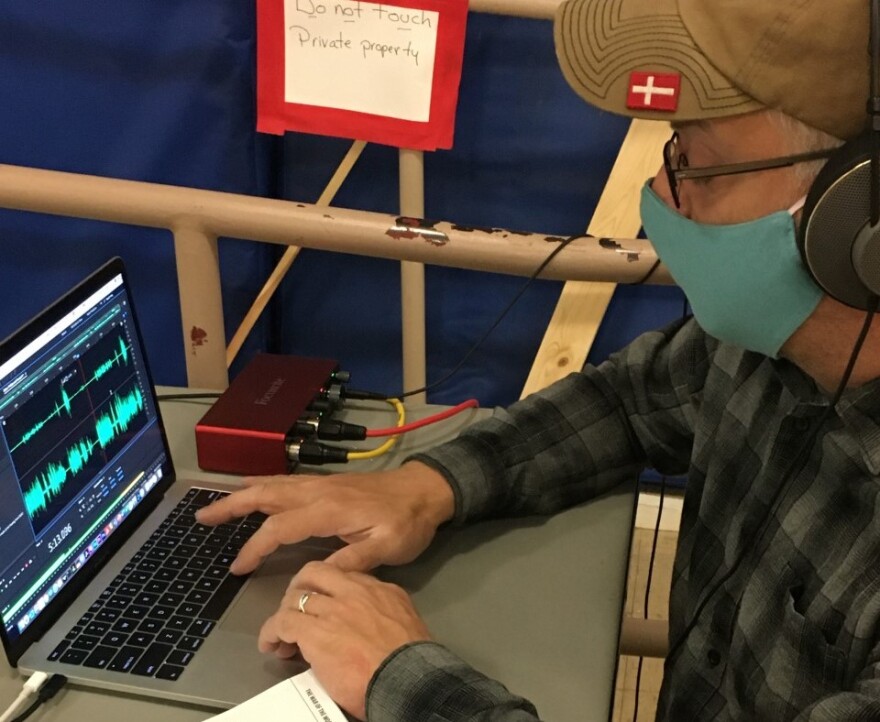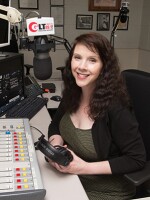There’s an old joke in public broadcasting: When is the best time to air a radio drama?
1938.
Now, we can add another year to that: 2020, as WGLT and WCBU will simulcast a recreation of a famous (dare we say infamous?) Halloween broadcast from 1938. It’s “The War of the Worlds,” and airs at 8 p.m. Oct. 30 on both public radio stations.
The new production gives Heartland Theatre Company a chance to again find its voice in the midst of the pandemic.

On Oct. 30, 1938, Orson Welles’ Mercury Theater on the Air presented a production of H.G. Wells’ sci fi classic, “The War of the Worlds.” But this wasn’t just your standard radio drama. Welles and his team had the cracking good idea to stage their dramatization as a typical radio broadcast of live music that is increasingly interrupted by live news reports from the field that eventually reveal the Earth is being invaded by Mars.
Some people bought into the taut drama, believing something was happening in Grover’s Mill, New Jersey. There’s still some dispute about how much panic truly ensued among the radio listening audience, but the show made such an impact that it continues to fascinate us today.
It’s not panic, but excitement that Heartland Theater hopes to inspire with its new recreation of the classic radio production, said Rhys Lovell, artistic director of Heartland Theatre Company. And that excitement started with the actors, who leapt at the chance to participate.
"We had the microphones 12 feet apart. And we had yours truly with Clorox wipes, wiping down the mics after every single actor went up to the mic."
“I was overwhelmed with the turnout for auditions,” said Lovell, who is doing double duty as director of the drama. “I had close to 50 people who sent me audition tapes. To put that into perspective, for a typical show, we might get anywhere from 15 to 20 people auditioning.”
The appeal of doing a radio drama as opposed to a standard stage play was certainly a draw, Lovell said. But mostly, he explained that actors are just hungry right now--hungry to get out there and perform again.
“That’s what feeds our souls, that act of creation. So, we’ve been thinking outside the box. It just made sense to me that radio was the way to go,” he said.
"One of the biggest questions that we faced early on was how true do we want to be to 1938 in terms of the fidelity of the recording?"
Because of the interest, the roles in “The War of the Worlds” were double cast with understudies as an inoculation of sorts against possible Covid-19 infections.
“I had such a great turnout at auditions that I was able to cast the show twice over with solid gold actors in both casts, the main cast and the understudy cast,” said Lovell.
To maintain social distancing, rehearsals were held over Zoom. It was a bit rough at first, Lovell admitted, but the cast soon adapted to the technology and before long they were ready to record. And again, safety procedures were strictly followed.
The first and only time the cast met in person was for the massive recording session held in the large Community Room at Heartland Theatre.
“We had the microphones 12 feet apart. And we had yours truly with Clorox wipes, wiping down the mics after every single actor went up to the mic. We all remained socially distanced and it went like clockwork,” Lovell revealed.
Acting is just part of the equation in radio drama. Lovell also expressed gratitude to his sound and recording engineer, Aaron Paolucci, who utilized 21st century technology to help the recording sound as though it time-traveled from 1938.

“When listeners tune in on Oct. 30, they’re going to be blown away by what he has done in terms of mixing in sound effects that sound like they’re state of the art,” Lovell enthused. “One of the biggest questions that we faced early on was how true do we want to be to 1938 in terms of the fidelity of the recording. Did we want the final product to have all that crackle and hiss and the pops and stuff like that?”
Yes, they did.
“I’ve worked with Aaron Paolucci so many times and I trust him implicitly. I deferred to him. I said if using all these great new effects that wouldn’t have been available to them back in the day, if you can use those, but still run it through some kind of filter so it sounds like old-timey radio, that’s what I’m going for. And that’s what he’s delivered.”
Also playing a big role in “The War of the Worlds” is the Mid-Atlantic accent that was so prevalent in radio and movies in the first part of the 20th century. It’s a cultivated accent that blends American and English accents, featuring softer British vowels and painfully clipped ‘T’s’.
(Think Katharine Hepburn in “Bringing Up Baby.” Better still, watch Katharine Hepburn in “Bringing Up Baby.” It’s a blast.)
“Thankfully, Connie de Veer was cast as one of the main announcers,” Lovell said. “Connie is a voice teacher at Illinois State University, so she was able to work with me and some of the other actors on finding that Mid-Atlantic accent.”

Lovell hopes audiences find Heartland Theatre Company’s production of “War of the Worlds” to be a great distraction in a year that just begs for moments of distraction.
“I hope they have fun, and I hope for one hour, their minds are taken away from what’s happening in our world," he said. There are too many awful things that have happened in the last year, and I want this to be a fun, entertaining diversion.
“And I hope people are ultimately encouraged to know that Heartland Theatre is still around and sending you good stuff.”
Lovell added that Heartland Theatre hopes to reopen in the new year, leading off with a production of the Moliere comedy, “Tartuffe,” in February.
People like you value experienced, knowledgeable and award-winning journalism that covers meaningful stories in Bloomington-Normal. To support more stories and interviews like this one, please consider making a contribution.





